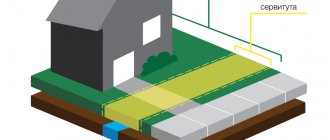Status of a non-privatized apartment
Non-privatized housing is a room in a communal apartment or a full-fledged apartment or house in the private sector, which has not been transferred to the private ownership of a citizen.
Regardless of the reason for receiving the premises: due to the social status of the person (disabled person, large family, etc.) or from the enterprise or organization in which he worked for many years, the rights and responsibilities are the same. However, the question regularly arises: “Can they be evicted from a non-privatized apartment?”
Why can you be evicted from a non-privatized apartment?
- Eviction in case of termination of the contract. This happens when a resident has bought a home or wants to move to another place.
- Loss of the tenant's rights to reside in the premises. That is, if the status of a low-income citizen was removed or service in municipal/state bodies was completed.
- For non-payment. If the tenant has not paid the bills for six months, the landlord has every right to ask him to vacate the premises. To do this, he goes to court. Usually the story ends with the person with the debt being provided with other housing. Often much worse and smaller in area.
- Eviction also occurs if there are systematic complaints from neighbors about noise and other amenities of neighborly relations.
- They may be asked to leave non-privatized housing if it turns out that much of it is damaged or completely destroyed.
- If parents are deprived of their rights to raise a child, they are evicted.
- Grounds for eviction may also be: demolition of a house, recognition of housing as dilapidated and unfit for habitation, assignment of the status of non-residential premises, major repairs that entailed a reduction in area and the number of square meters per resident is less than the standard, and also if the apartment is transferred to a church.
Social hiring
Living in non-privatized housing does not happen by itself, but is documented.
The check-in procedure is standard:
- the authorized body adopts an order on the provision of housing;
- a warrant is issued that is valid for a limited time;
- a social tenancy agreement is concluded, usually for an indefinite period.
If housing was obtained before the current legislation came into force, then the relationship is viewed through the prism of concluding a social tenancy agreement. For example, housing was provided during the Soviet period, but when considering the dispute, the provisions on social rent are taken into account.
Eviction through court
A social tenancy agreement for owners of a non-privatized apartment provides for the fulfillment of a whole list of responsibilities. In addition to those mentioned above, the following are worth mentioning:
- maintaining silence at night;
- timely repair of non-privatized living space;
- monitoring the serviceability of real estate utilities.
When a social tenancy agreement is violated, the offender’s neighbors or the owner of the property, represented by the municipality, have good reason to file a claim in the courts in accordance with Articles 131 and 132 of the Code of Civil Procedure. At the same time, is it worth figuring out how to evict from a non-privatized apartment through the court?
In this matter, the legal basis is Articles 60 to 89 of the Housing Code of the Russian Federation. Article 84 is especially important. It sets out the consequences for the defendant if he is found liable for a debt on the property or for trespassing on a neighbor's rights. The process is carried out in court. Arbitrariness on the part of the neighbors of the former owner of non-privatized housing or abuse of authority by municipal officials, even on legal grounds, is unacceptable.
Legislative regulation
What documents answer the question of whether they can evict from a non-privatized apartment?
- LCD - Housing Code.
- Civil Code of the Russian Federation - Civil Code.
- Regional laws and regulations.
- Federal Government Regulations.
The housing complex contains basic rules: the grounds for obtaining housing, the rights and obligations of residents, the procedure for concluding a social tenancy agreement and its termination.
The norms of the Civil Code are of a subsidiary nature, i.e. they complement the norms of the Housing Code if a gap in regulation arises.
From the by-laws, you can indicate a standard social tenancy agreement.
Regional authorities adopt regulations on the conclusion of social tenancy agreements. They contain both a sample contract and a list of documents and describe the procedure for the authorities and the applicant. If the apartment is not privatized, can they be evicted from it? The law provides an answer based on specific circumstances. In one case they really can, in another - not.
Judgment
Courts are required to take into account specific aspects, including:
— How long is the tenant absent from the apartment, what is the nature of such absence;
— Proof that the tenant does not pay utility bills - checks, receipts indicating the amount of debt;
— The basis for the absence of a tenant in a municipal apartment in which he lived on social rent.
The applicant is obliged to provide evidence of the fact that the tenant does not occupy the living space, does not pay rent, without having compelling reasons for this.
Whether they can be evicted from a privatized apartment for rent arrears, see here.
The court decision necessarily indicates what kind of premises will be provided as a result of the expulsion of the tenant from the previous living space.
Drawing up a statement of claim
The claim must be filed in accordance with Article No. 131, No. 132 of the Russian Code of Civil Procedure. This document consists of the following information:
- Name of the judicial authority.
- Information about the defendant, applicant.
- Actual residential address of the plaintiff and defendant.
- The essence of the applicant's demands.
- List of violated rights.
- Evidence of requirements, relevant references to regulations.
- Plaintiff's signature.
Required documents
The following documents must be attached to the claim:
- witness's testimonies;
- social rent agreement;
- receipts, checks confirming the fact of the last payment for housing and communal services (if there is no receipt, it is permissible to request confirmation of payment from the management company, which will provide information about the presence of debt at a specific address, for the last payment period);
- certificate of payment of state duty;
- confirmation of the defendant’s registration in non-privatized housing.
Video: Can they be evicted if the apartment is not privatized:
(No Ratings Yet)
Grounds for eviction
Receiving housing for use from the state or municipality is determined by the status of the person. In some conditions, the reason for which it was provided disappears, and the tenant is evicted. In others, circumstances have not changed, then eviction is impossible.
What circumstances cause eviction?
- the grounds for moving in are temporary;
- the tenant systematically violates the rights of other tenants;
- a person damages the apartment in which he lives;
- debts for utilities have accumulated;
- recognition of the house as unsafe;
- the tenant has actually moved to another residence for an extended period of time.
The list presented is not complete; each item has many options.
Eviction from a non-privatized apartment is permitted if there are circumstances specified by law.
Grounds for forced eviction
Residents who own a non-privatized apartment under a social rental agreement are required to maintain the proper condition of the housing and pay utility bills on time. Failure to fulfill these obligations, debts for the apartment, violation of the rights of other tenants leads to the fact that municipal authorities receive grounds to evict a tenant from a non-privatized apartment, without obtaining consent.
For more detailed information, we recommend that you consult with our lawyer. You will receive answers to your questions.
With kids
The rights and freedoms of minor residents of non-privatized apartments are also protected by the Housing Code of the Russian Federation. Eviction of this category of citizens from their living space by municipal authorities occurs extremely rarely. Getting it through the courts is difficult.
For this reason, parents are wondering: can they evict children from a non-privatized apartment? As a rule, no. When a father and mother violate the rights of neighbors, carry out illegal redevelopment of property, they have a six-month debt for utilities, the son and daughter are not responsible until they themselves reach adulthood.
The tenant may be forced to correct offenses or move to a similar non-privatized living space after going to court. A family with a child is rarely evicted from the premises.
Neither the municipality nor the neighbors receive the right to evict a citizen from non-privatized housing if he has a child who has not reached the age of majority. Even through the court and legally.
For debts
Banks rarely issue loans to citizens who are renters and not homeowners. If the tenant does not repay the loan debt, then it is impossible to obtain a municipal apartment from him as collateral. The owner of non-privatized property is the state. And this is a financial risk for the bank and the absence of legal grounds to sue a citizen in order to seize his living space and compensate for his expenses.
The situation with debts for utilities is not so rosy for the tenant. If the question arises whether they can be evicted from a non-privatized apartment for debts on housing and communal services, then the answer is yes. But, on the basis of the Housing Code of the Russian Federation, and only when the debt for housing exceeds six months. When a trial is held and the plaintiff is found guilty, the owner, represented by municipal authorities, receives the right to forcibly evict the tenant.
No housing provided
Can they be evicted from a non-privatized apartment without providing other housing? When it comes to debts for housing and communal services - no. But, for certain offenses, this is possible:
- illegal redevelopment of an apartment;
- violation of neighbors' rights;
- living without registration and registration, for example, as a result of divorce;
- deliberate destruction of municipal property and communications;
- use of non-privatized housing for other purposes, for example, for commercial purposes.
These options are considered in court and supported by reliable evidence from the plaintiff - the municipal body or the neighbors of the defendant, who is the owner of the living space.
What rights and responsibilities does the tenant have?
Do those living in a non-privatized apartment have much less rights than if they were the owners? The tenant has, according to the law, the following list of rights:
- move in your family members;
- rent out part of the housing to another person or persons for a temporary or unlimited period;
- replacing or exchanging residential premises for another, more suitable one;
- demand the provision of utility services and participation in major repairs.
Existing rights are closely related to responsibilities. The law obliges the tenant:
- use housing only for living (for example, organizing industrial production is prohibited);
- ensure the safety of the premises (carry out routine repairs, monitor communications so that, for example, there is no flooding of neighboring apartments);
- pay utility bills in full and on time;
- inform the authority that granted the right to premises about changes in circumstances affecting the prospects for further residence; for example, that the financial situation has changed, and the owner of the premises is no longer low-income.
Agreements signed with residents have more specific provisions, but we must remember that they are not exhaustive and the current legislation is also added here.
Who decides the issue of eviction?
Can they be evicted from a non-privatized apartment only by decision of the administration or the organization that provided the housing? No, the Constitution limits the list of persons who have the right to evict a citizen. Now only the court has this right. Interested parties have the right only to file a claim for eviction.
A judicial act that has entered into legal force is executed by bailiffs. The police are supporting them. This means that the police or other official do not have the right to evict someone without a court decision, and one that already has legal force. It doesn't matter what caused it to be adopted. Even if we are talking about reporting information that actually did not take place, which became known after the move-in.
Eviction from a privatized apartment
Can they be evicted from a non-privatized apartment or from a privatized apartment? At the place of registration, legislation ensures the rights of residents. This may seem like something that won't change.
In most situations this is what happens, but sometimes there is a very real chance of losing your right of residence. Various situations related to this will be considered. Eviction from a privatized apartment can only occur as a result of a court decision.
Judicial practice regarding eviction from a privatized apartment suggests that this requires serious violations.
General view of the situation
When moving out, there are several different options available:
- voluntary eviction;
- forced eviction.
There is another important criterion. It has to do with who exactly is being evicted from the apartment in question.
In the vast majority of cases, we are talking about someone who has permanent or temporary registration at this place, but is not the owner. In some situations, the law allows the eviction of the owner of the property as well.
Can they be evicted from a non-privatized apartment? The reasons for eviction here are usually the same as for privatized apartments.
When talking about deregistration, it is necessary to understand that in this case a thorough analysis of all accompanying circumstances takes place in court, and a decision is made only when there are serious grounds for this.
Various options
The simplest situation in the issue under consideration arises in cases when we are talking about voluntary discharge. For what reason can a person voluntarily leave his home? There can be a variety of reasons for this.
One example is that he moves permanently somewhere else. This may be not only another region, but simply another district of this city.
So, if such a need arose, what exactly would need to be done?
- Prepare the necessary documents. In this case, the woman will need her passport. For a man, in addition to a passport, you will need to take a military ID.
- You will need to go to the passport office at your place of residence and fill out the appropriate application. This application will be accepted and will be considered for some time.
- No later than three days later, the extract will be issued and a corresponding note will be made in the citizen’s passport.
Subsequently, you will need to register at your new place of residence.
Eviction of the owner
It may seem that title to property is guaranteed to prevent eviction. However, we should not forget that the owner of the apartment has not only rights, but also responsibilities to society.
Can the owner be evicted from a privatized apartment? If he violates the rules of residence, then yes, he can be evicted from the living space he occupies.
But this usually happens only in the most extreme cases and with repeated repeated violations.
Usually, if this happens for the first time, comments are made to the owner. If violations continue, matters may result in administrative fines. If this does not help, then in some cases the person may be evicted from the living space he or she occupies through the court. What kind of violations can be taken into account in such cases?
- One of the reasons is the use of the apartment not as housing, but for some other purpose.
- A rather important reason is behavior when the rights of apartment neighbors are violated. This could be loud noises at night or some form of threatening behavior towards others.
- The reason may also be behavior that leads to significant damage or destruction of one’s own apartment. If this goes far enough, it can become grounds for eviction from the apartment.
Any of these reasons may be considered in court.
Severance of family relationships
When people start a family and have children, they want to believe that the family is indestructible and will always exist. Unfortunately, it is not so rare for things to happen differently. What is the situation with the right of residence? There are several different options possible here.
If the privatization of the apartment took place at the time the marriage was concluded, then the situation here will be quite simple.
In the process of privatizing an apartment, each of its residents has a simple choice:
- agree to participate in privatization;
- give it up.
In the first case, all residents become co-owners of the property. As such, they have the right to register on the living space in question without asking anyone's permission.
It is also possible that one or more residents refuse this procedure in writing. By law they have the right to do so. However, such a decision determines the lifelong right to reside in this living space.
When a family breaks up, nothing changes in this regard. Moreover, it is important to note that this applies not only to adults, but also to children.
A completely different situation occurs in cases where registration was made in connection with marriage.
Important!
If one of the living spouses is the owner and the other is not, then the latter is obliged to vacate the occupied living space. If children were born in this family and during the divorce they do not remain with the owner of the apartment, they must move out together with the other spouse.
While this is the general rule, there is an exception. Sometimes this eviction can be delayed by going to court. This is possible if the evicted person, for one reason or another, is not able to ensure his own existence.
However, such a measure is not indefinite, and it can only be obtained by filing a lawsuit in court.
A completely different situation arises when a divorced husband is obliged to pay alimony to his wife and child. In this case, he not only pays a certain amount for the maintenance of children, but is also obliged to provide equal or better housing for his former family.
Another option arises if, at the time of marriage, a marriage contract was drawn up. Of course, the situation depends precisely on what specific issues were raised in the agreement in question.
If there was an agreement to continue living in this apartment after the divorce, then this is the right thing to do. In this case, the legislation may allow different points of view on the issue under consideration, as evidenced by the existing judicial practice of considering similar cases.
In addition, the corresponding article of the Housing Code does not formulate the form in which this agreement should be reached, written or oral.
If the agreement was in written form and certified by a notary, then this may be the decisive argument in a court hearing, however, if there was an oral form of the agreement, then various options are possible.
Evicting a child
Although this may seem too harsh, there are situations where this measure seems quite logical.
For example, a husband and wife divorced, a minor son lives with his mother, but is registered with his father, who is the owner of this apartment.
In this situation, it would be quite reasonable for the father to try to discharge his son so that he is registered with his mother, where he actually lives. What legal perspective do such claims have when they are considered in court?
What's important here is:
- the mother is registered in this living space;
- her mother was discharged from her.
The main circumstance is the fact that the mother was discharged from the father’s living space. If this was not the case, the minor child will not be discharged. If both of them are discharged, then first we talk about the mother and only then about the child. It will not be possible to discharge one child without parents from a privatized apartment.
Another important feature is that with such an extract the entire process is controlled by the guardianship and trusteeship authorities. If this was not the case, then the decision of such a court hearing can subsequently be declared illegal.
Eviction due to inappropriate behavior
The most common type of violation, which can quite realistically lead to eviction, is rowdy. When going to court for this reason, it will be necessary to collect comprehensive evidence of the tenant's antisocial behavior.
Suitable for this purpose:
- witness statements;
- results of shooting with video cameras;
- any other evidence.
There is usually no eviction on a first violation. In this case, a reprimand is made, and an administrative fine may also be imposed. In case of repeated violations, the violator may be sued.
It is important to note that in such cases, on these grounds, it is possible to evict not only the registered tenant, but also the owner of this residential premises.
Use of residential premises in another capacity
Ownership of real estate sometimes gives the owner the feeling that he can do whatever he wants here. In fact, he has responsibilities. One of them is that residential premises can only be used in this capacity, only to live in it. This rule can be broken in various ways.
For example, transform your own apartment:
- to a production workshop or warehouse;
- to a gambling establishment;
- in a cafe and so on.
If this happens, then this fact gives the court grounds to evict this tenant. In this case, it can be either just a tenant or the owner of the apartment. In a sense, damage to an apartment, cluttering it, or actions that lead to the destruction of real estate can be considered a violation close to this. This is also one of the grounds for eviction.
Then, when a tenant voluntarily left his apartment for a long period of time, he may be discharged by court decision. This also applies when it comes to the right of lifelong residence due to refusal to participate in privatization.
Advice!
In this case, not any absence is considered, but only those that are not due to valid reasons.
An example in this case could be a long business trip for several years or, for example, serving a sentence under a court verdict, which in itself does not violate the right of the convicted person, although not the owner, to the right to live in an apartment. In the latter case, after release, he will be able to live again at his previous place of residence.
Illegal execution of documents and other reasons
Sometimes a situation may arise when a deliberate mistake was made when preparing documents for registration, as a result of which a situation arose to which the citizen actually did not have the right. In practice this happens in two main cases.
- If there are several owners of the apartment in question, but the tenant has not received consent from all of them. By law, everyone must agree, and their opinion must be expressed in writing.
- Another problem arises if the tenant used false documents.
There is one important exception to the first situation discussed. You can register without the consent of others if we are talking about a minor child. Of course, any of the owners has the right not to ask the permission of others for their registration here.
Other reasons should also be mentioned. One of them occurs when the resident’s temporary registration expires. If it is not extended, he loses the right to reside in this living space and is subject to eviction.
If there is a systematic refusal to pay utility bills. Of course, this can lead to eviction only if we are talking about malicious and prolonged non-payment.
It is worth mentioning another option for eviction.
Sometimes we are talking about emergency or low-quality housing, when an extract is made for the purpose of providing housing of better quality and in accordance with the standards for area per resident.
In other cases, we may only be talking about temporary eviction for the purpose of major repairs and final relocation. This method also applies if the apartment is not privatized.
It is quite possible that the owner is going to sell the apartment. In this case, the right of residence of his family members is terminated when the real estate is sold.
However, this does not mean that this termination will necessarily affect other residents. For example, if a certain person has the right of lifelong residence, it will remain with the new owner of the apartment. In this case, the tenant is not discharged from the apartment. This issue can significantly affect the cost of housing.
Features of participation in the case
The facts confirming the termination of the right of residence are proven by the plaintiff. Only the administration, or government authority, or organization that provided housing can act in this capacity. The management company with which the contract for maintenance of the house is concluded does not have such a right. Residents whose rights are violated also have the right to file a claim.
What rights do tenants living in a non-privatized apartment have when one of them is evicted? They preserve them in full. For example, a family lives in an apartment, and they want to evict one of its members in court. The court is obliged to ensure their participation in the case as third parties, because the proceedings affect their rights and interests.
Features of proof
If the apartment is not privatized, can they evict? Yes, but the claim must be substantiated. Often, as a result of legal proceedings, it turns out that there is a debt for services, but it is not large enough and the reason for the accumulated debts is due to difficult life circumstances.
If we are talking about the destruction of a residential premises, its damage, materials from the housing inspection are provided. Her responsibilities include identifying violations of housing laws. A protocol is drawn up in accordance with the norms of the Code of Administrative Offenses, then a decision is made to prosecute.
Having two or more such decisions, the apartment owner will have the right to go to court.
Some residents constantly make noise, make trouble, and disturb the peace. In this case, the police take action. A protocol is drawn up, then a decision is made. As a rule, the court already makes a decision on police reports. In particular, the grounds for eviction are facts of violence.
It is important to comply with the procedure for bringing to administrative responsibility, the actions of the authorities according to their competence, otherwise a well-founded claim will be rejected.
Grounds for eviction of an unregistered resident from an apartment
Eviction from an apartment of an unregistered person who is not the owner can be carried out if the tenant has lost the right to reside in the apartment or never had it. The following are the most common grounds for eviction of unregistered residents:
- Change of property owner. From the moment of registration of ownership rights to real estate of a new person in the Unified State Register, relatives and cohabitants of the previous owner who are not registered in the apartment must move out. If these persons refuse to vacate the premises, the new owner of the apartment can evict them by appealing to the district court.
- Loss of family ties with the resident. After a divorce, the owner has the right to evict the former spouse from the apartment if the property was not acquired during marriage. Also, eviction of a former spouse is possible if the former spouses have previously signed a marriage contract, which states that one of the parties waives claims to common property (an apartment in particular) in the event of a divorce. If the apartment is the common property of both former spouses, you can buy out the co-owner’s share with his consent. It is impossible to lose family ties with the common children of both spouses, so they still have the right to live in the apartment even if they are not registered in it.
- Expiration of the lease agreement or failure to comply with the terms of the lease agreement. If the landlord has not expressed a desire to draw up a new lease agreement for the apartment, after the expiration of the period specified in the document, the tenant is obliged to leave the apartment voluntarily or with the help of a local police officer. A tenant can also be evicted if they do not comply with the terms of the lease agreement (payment of rent, utility bills, damage to property, etc.). How to evict tenants who do not pay, read the article https://realtyinfo.online/7148-kak-vyselit-kvartirantov-iz-svoei-kvartiry-na-zakonnyh-osnovaniyah. If the tenant does not want to voluntarily vacate the apartment due to non-compliance with the terms of the contract, the owner can turn to the courts for help.
- Apartment owner requirements. If an unregistered resident does not have family or marital ties with the owner, is not one of the owners or a tenant of the residential premises, he does not have the right to reside in the apartment, unless he proves otherwise in court. To evict such a tenant, it is enough to call the police at night and complain that there are strangers in the apartment. People who have refused in the past to privatize the agreed apartment may also be evicted as a result of a corresponding court order if they are not registered at this address.
The reasons for eviction from an apartment will be discussed in detail in the video.







